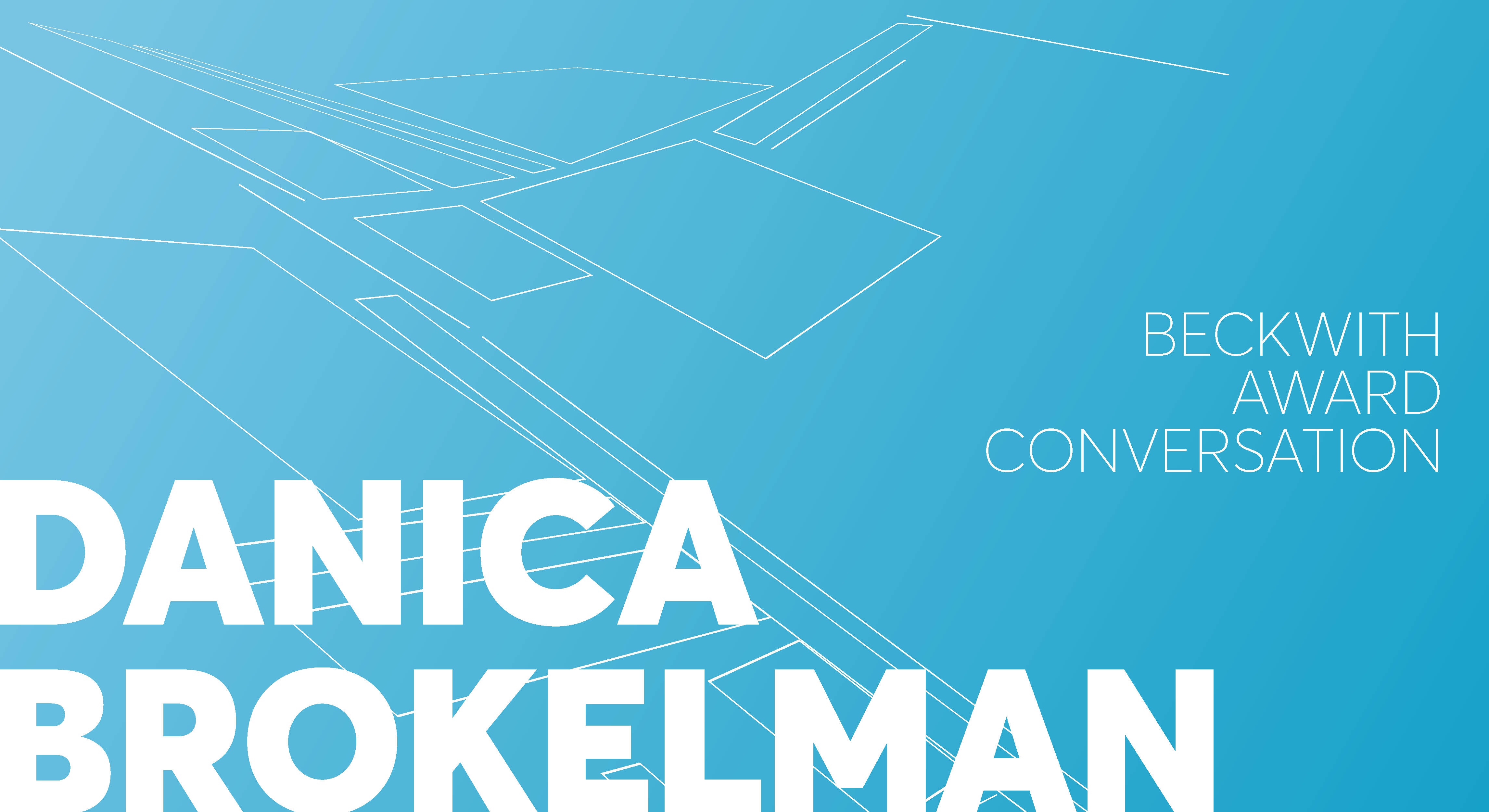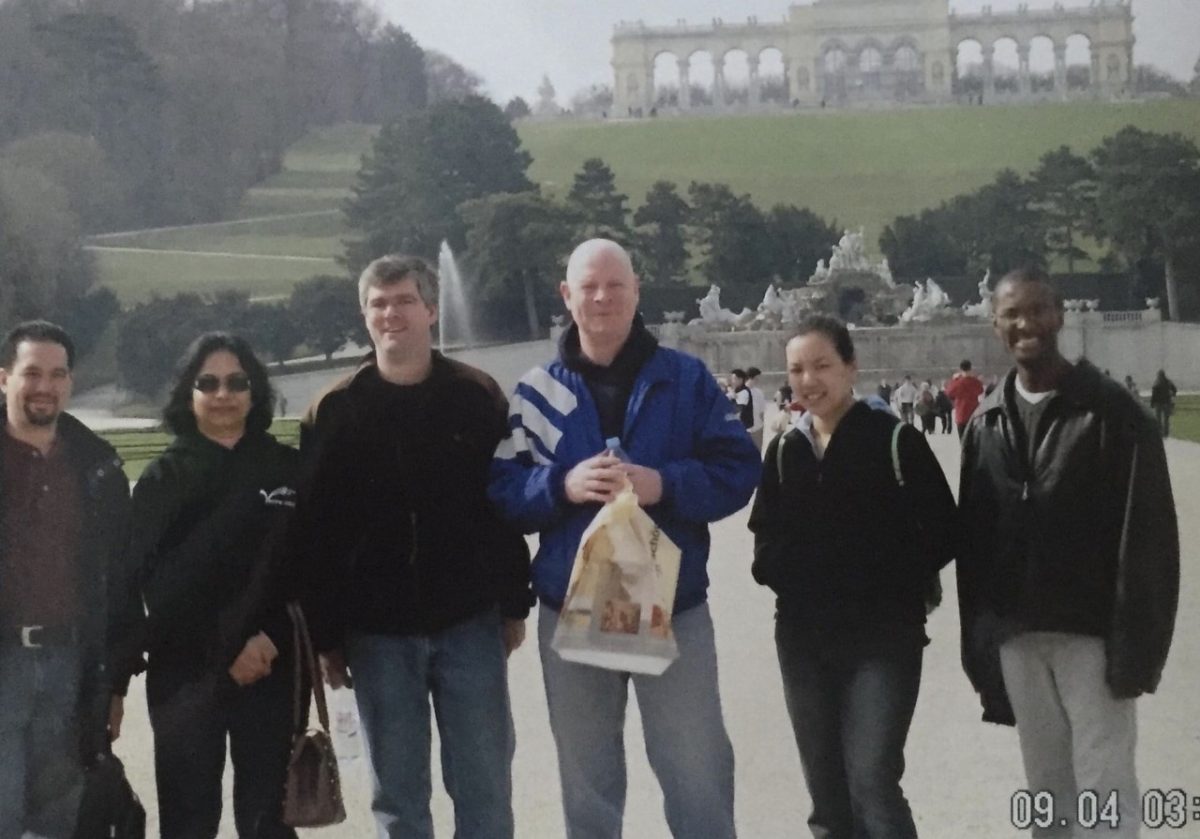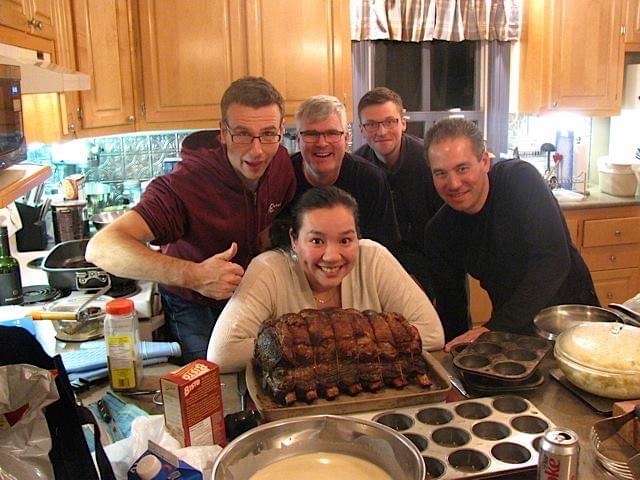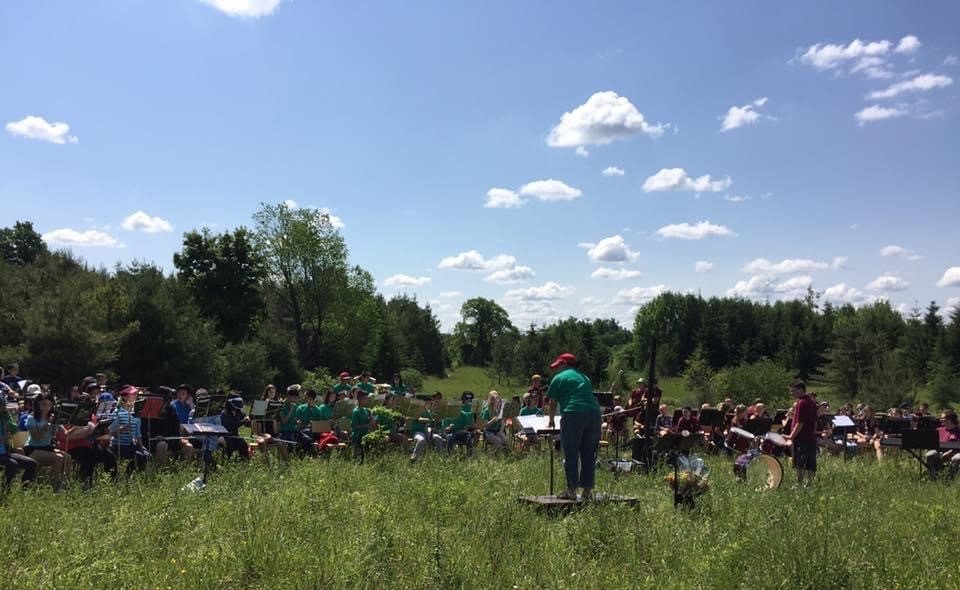By Matthew Fava & Charles Glasspool
Over the past year, CMC Ontario was in discussion with this organization’s co-founder John Beckwith to develop the Beckwith Award. Through the award, we are acknowledging the extraordinary contributions of Ontario-based organizations and individuals towards connecting audiences and learners with contemporary music and composers.
During our initial discussions in the fall of 2019, John Beckwith and CMC Ontario council members agreed it would be crucial to highlight the role of music educators in the province. We had no idea that the subsequent labour actions, and the present pandemic response, would cast the importance of public education into such sharp relief.
CMC Ontario Director Matthew Fava, and CMC Ontario Council Member Charles Glasspool reached out to the educators recognized by the award, Dan Austin, and Danica Brokelman, to hear about their career experiences, as well as thoughts about music education and its importance in the present moment.
Today we feature our discussion with Danica Brokelman, who teaches elementary school music in the York Region District School Board.
CMC: I think a lot of us have epiphanies: moments in our life when we come to a deep understanding of ourselves, of our relationship to the world, so on. And I think a lot of us have epiphanies that are tied to musical experiences. Tell us about a music educator who inspired you, or other artists who changed your relationship to music.
Danica Brokelman: I try and learn from all of the music educators I come into contact with to gain new perspectives and ideas that can be applied in different ways. But if I had to choose one educator who inspires me, it would be George Taylor. George inspired my whole career; he saw me as a music teacher long before I did, and without him I doubt that I’d be teaching music at all. I met George when I was 14, when I started high school, and he’s been a constant in my life since then – playing the roles of teacher, mentor, colleague, and friend.
The thing is, I’m a music teacher without a music degree. Not entirely uncommon in the elementary panel, but uncommon enough that I was really insecure about my abilities for a long time. I needed a lot of reassurance and guidance as I went through those first few years, and George was there every step of the way: he helped to organize an after school mentorship program for my elementary bands and partnered them with his grade 11 and 12 students; he took the time to sit with me and coach me through repertoire selection, and score reading; he walked me through festival and concert preparation, and talked me through classroom management in a music room; and he answered every question I ever asked, no matter how big or small. And like the incredible educator he is, George always knew if I needed sage advice, academic instruction, gentle encouragement, or a swift kick in the behind to get things done. What George really showed me is how much we can do when we take the time to nurture and develop people within their strengths. Though he is now retired, he is still the person I call, for all things, big and small.
In addition, George headed a department that was full of people who have also been a phenomenal system of support and knowledge. Sean Hu-A-Kam, Lyle Corrigan, Terrol Sinclair, and Will Stokes were in their music office on the day I was hired for my first job, and shared in the laughs of my terrified expression. Each one, in their own unique way, has given me a different perspective on music education and their approaches to it.
Images of Danica with various music education colleagues. Click through for photo captions.
Sean’s clear and precise practicality are an example to music teachers everywhere, and are further demonstrated in his leadership capacities. He has a gift for being able to take a notion, or an idea, and then transform it to be executed with accuracy and grace. Lyle’s distinctive sense of humour combines with his creativity and musicianship to form an environment that is rich in both laughter and learning. Terrol takes the time to be reflective and reflexive in his professional practice, where he thoughtfully combines theoretical pedagogy with classroom instruction. Will has the ability to make every kid in the room feel like a true musician in a short time; his way of teaching and speaking inspires students to bring the best parts of themselves to create music, and it is awesome, in every sense of the word, to watch. I have learned (and laughed) so much with this group of exceptional educators. They have encouraged me, problem solved with me, and are always welcoming when I drop into their space completely unannounced. They allow me to share ideas, vent, and pick their brains when mine has run dry, and I am forever grateful.
In the performance aspect, a moment that shifted for me was when I started playing in community ensembles. I had stopped playing music shortly after I left high school, and so when I started teaching it had been quite a few years since I’d picked up an instrument in any meaningful way. I also knew that in order to be a better teacher for my students, I had to improve as a musician, and community ensembles gave me the opportunity to do that. It also made me think about music and its place, how we teach it, and how we convey its importance. Community band showed me that there is always space for people: that even outside of school, if you’re willing to put in the time there will always be a place for you in music. A place that is welcoming, and a place where each of us can be successful. Community orchestra showed me that there are wonderful musicians who work jobs that have nothing to do with music, and then come together to create beautiful sounds when the work day is over.
CMC: Was music always a collective activity for you? Was there a moment that perhaps a personal experience of music bridged with playing in an ensemble?
DB: From an educational aspect, music is a collective activity in the ways we collaborate. I’ve often said that being an elementary music teacher can be one of the loneliest jobs in the busiest rooms. Elementary music teachers have no departments, no grade partners, no subject specific PA days, and often nobody in a school that really understands what we’re trying to do. There often aren’t people to just pop in and see, or bounce an idea off of when creativity strikes. We have to forge our own collectives in order to learn professionally, collaborate, and keep our sanity. I have been so lucky to have been able to make an elementary music family. Jill Morrison invited me to join the Markham Area Band team early in my career, and I was really unsure if I was ready for that kind of performance based group. I talked to George about it (see, he’s everywhere), and he told me to just join. Stop worrying about whether or not you’re good enough and go learn something. So I did.
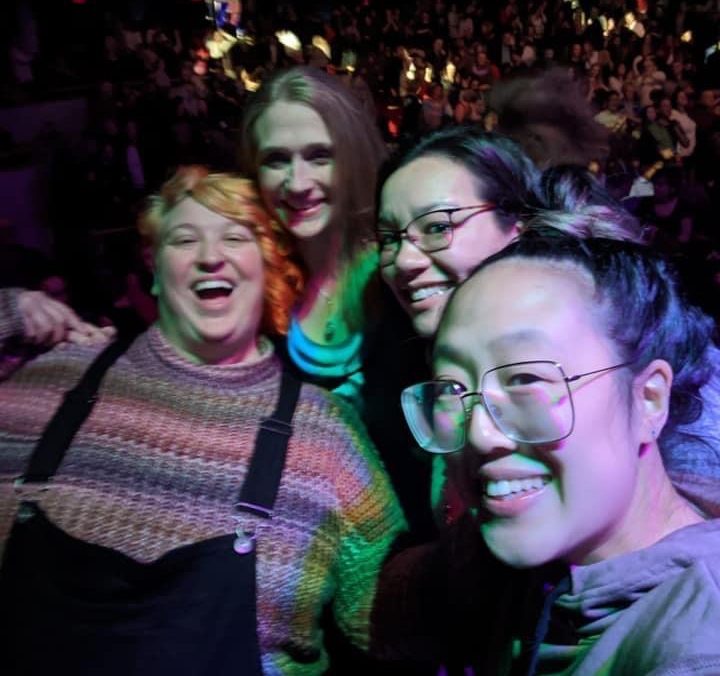
The Area Band team flexing their choral skills on stage at Choir! Choir! Choir! February 2020. L-R: Catherine Kloepfer, Elizabeth Colley, Danica, and Amanda Da Silva.
CMC: What does music education mean in the present moment? I know there is the possibility that students will pursue a career in the arts, but that isn’t necessarily the primary outcome of our work.
DB: A successful elementary music program, to me, is a program that develops in its students a sense of confidence, critical thinking skills, the courage to question what they hear, and the determination and discipline to work hard, and work smart, to improve; and to have all of these things with an appreciation for music, musicianship, and for being part of an ensemble. Not all of my students will take music in high school, and that’s ok – that’s not a failing to me. If they have taken out of my class the skills to be more thoughtful in their actions and interactions, I’ll take that as a win. For those who do take music in high school, I hope that their time with me has built a solid foundation for the basics of musicianship that can carry them through as they expand their skills and understanding. I also hope it is the start of a lifelong relationship with music.
Danica conducting the massed band at Flesherton Hills Outdoor Music Festival. Band made up of students form Coledale Public School, Ramer Wood Public School, and Macphail Memorial Elementary.
CMC: How are you engaging with your music students during the pandemic?
DB: Honestly, some days I feel like online music education is working, and some days I feel like it’s not. The feeling of collective security that is the Music Room just doesn’t quite translate online. With concerns about privacy, technological limitations, and just trying to be respectful of the fact that this is a traumatic time for a lot of families, sometimes it feels like what I do is simultaneously too much for some students and too little for others.
CMC: Between labour actions, and the pandemic, this has been an incredible watershed moment for educators in terms of the public perception of their role. What do you want the wider public in Ontario to appreciate about your efforts? What are the misconceptions that you encounter?
DB: I honestly think the pandemic has shown people the value and importance of the Arts. Once we were in our homes, it was the Arts that came to the fore; the Arts are where we have all turned to get us through these turbulent times. The live performances, virtual performances, the creativity, and the genuine emotion that has been displayed has breathed life into an otherwise dark time. My hope is that we can remember just how much we relied on the Arts, and that it can be translated into the Arts being just as integral to education as Math and Language.
I wish every parent and student could understand that the value of music runs into so many aspects of life. Music gives us the opportunity to play a part in something larger than ourselves. It’s the ultimate team sport: nobody sits on the bench, and there is space for every player. Music teaches resilience, fosters grit, builds discipline, and encourages responsibility; all while allowing students an avenue of expression and an opportunity to embrace empathy. Music gives us a more beautiful world to live in and experience, and develops in us the transferrable skills to build it.
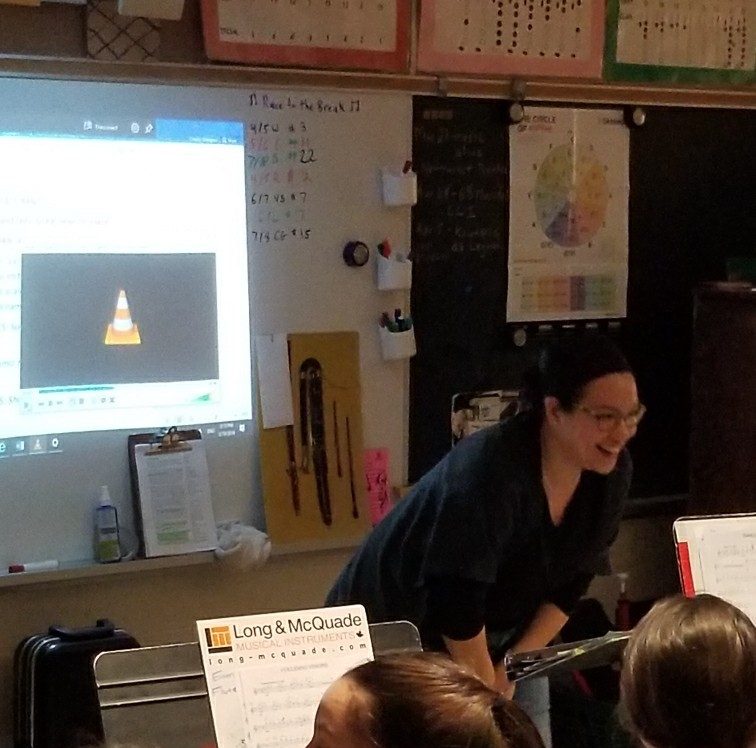
Workshop with band students from Macphail Memorial Elementary.
Our feature with Dan Austin will be posted in the coming days, be sure to check back.

